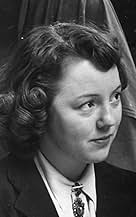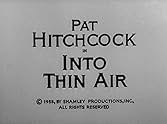Into Thin Air
- Episode aired Oct 30, 1955
- TV-14
- 30m
When a young woman leaves her ill mother in a Paris hotel room and comes back later, she finds her mother is missing, and all the hotel's employees deny she and her mother were ever there.When a young woman leaves her ill mother in a Paris hotel room and comes back later, she finds her mother is missing, and all the hotel's employees deny she and her mother were ever there.When a young woman leaves her ill mother in a Paris hotel room and comes back later, she finds her mother is missing, and all the hotel's employees deny she and her mother were ever there.
- Director
- Writers
- Stars
- Diana Winthrop
- (as Pat Hitchcock)
- Bellhop
- (as Albert d'Arno)
- Director
- Writers
- All cast & crew
- Production, box office & more at IMDbPro
Featured reviews
"I'm not going out of my mind"
When Diana Winthrop (Hitchcock) books herself and her sick mother (Mary Forbes) into a Paris hotel, she doesn't give a second thought to her own mental health. However, after being sent away to collect some medicine for her mother, Diana returns to find that her mother is missing, and, worse still, nobody in the hotel claims to remember her. Beginning to doubt her sanity, she seeks help from the British embassy, but they have a hard time taking her word over that of half a dozen hotel employees and a sign-in register from which the name Winthrop has disappeared. The story fits snugly into the half-hour time-slot, though the conclusion is not as satisfying as it might have been. "Into Thin Air,' just like 'The Lady Vanishes,' toys with the intriguing question of how one can maintain confidence in their own sanity if everybody is scheming against them. After all, as Orwell put it, perhaps a lunatic is simply a minority of one.
Into thin air
Patricia Hitchcock is quite endearing as a daughter who finds her mother missing. You can feel her desperation. The story is a reworking of 'So long at the Fair' and the Lady Vanishes. It's quite impressive how the plot and good characterisation can be efficiently condensed into 25 mins. It's a watchable thriller with a satisfying twist.
the short story of lady vanishes
Solid Version of the Story Idea, & A Nice Opportunity For Pat Hitchcock
Pat Hitchcock plays a young woman traveling in Paris with her mother, and experiencing a series of disorienting and frightening events when her mother becomes ill and then disappears. Everyone around her insists on denying facts that she knows to be true, and indeed they always have convincing ways of proving her wrong. If you look at the story from a coldly clinical perspective, there are perhaps a couple of holes in it, and the resolution is perhaps not completely satisfying, but while it lasts, it succeeds quite well in establishing a convincing atmosphere of baffled fear.
In his closing appearance, Alfred Hitchcock plays the proud father, at least to the degree that his dry nature allows him to. Pat Hitchcock was never going to be a star, but she obviously shared her parents' enthusiasm for making good movies, and she always gave solid, believable, sympathetic performances in the various character roles in which she appeared. For Hitchcock fans, it's very nice to see her get this chance to take the spotlight herself for a little while.
Not again!
The best version is undoubtedly "So Long at the Fair", though of course Hitch is proud of his similar "The Lady Vanishes". Pat Hitchcock checks into a Parisian hotel with her mom, who feels ill, and suddenly everyone covers up the fact that mom ever existed.
I suppose if one has never encountered this particular story gimmick it might prove suspenseful, but once it becomes apparent, the trip to the final reveal is just boring.
Did you know
- TriviaThe story is based on a late 19th Century legend known as the Vanishing Hotel Room. It previously served as the basis for one of the segments of Eerie Tales (1919) and So Long at the Fair (1950).
- Quotes
[first lines]
Himself - Host: Tonight we are going to tell the story of a woman who disappears into thin air. By the way, have you noticed that thin air seems to be the type of air most conducive to disappearances? There, certainly, is a fact well worth knowing. Now, in case you seem to recognize parts of the story, don't be alarmed. It is familiar because it is a classic of its kind. Many, many people have borrowed this legend, quite profitably, too. Two novels have been written about it, and it has been made into a motion picture called "The Lady Vanishes." Once by no less a personage than, uh, Alfred Hitchcock. It was also related by Alexander Woollcott in his book, "While Rome Burns." Here, following our sponsor's all too brief message, is our version of that famous old tale. Now I had better get out of the way to enable you to see better. May I have a bit of thin air, please?
- ConnectionsReferences The Lady Vanishes (1938)
- SoundtracksFuneral March of a Marionette
Written by Charles Gounod
Details
- Runtime
- 30m
- Color
- Aspect ratio
- 1.33 : 1

















